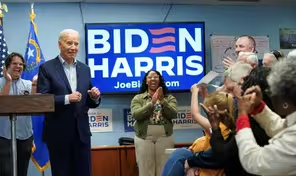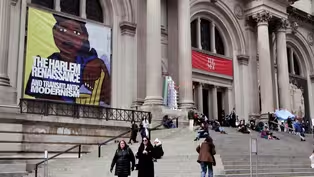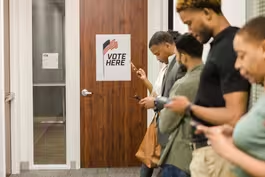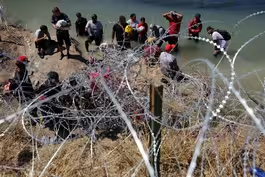
What's next for Israel as Netanyahu, Biden rift widens
Clip: 3/19/2024 | 6m 52sVideo has Closed Captions
What's next for Israel and war in Gaza as rift between Netanyahu and Biden widens
Israeli Prime Minister Benjamin Netanyahu reiterated his determination to send troops into Rafah, in southern Gaza, to rout remaining Hamas units. The drive has led to a rift with the Biden administration as it warns against an Israeli operation before more than 1.3 million Palestinians can move to safety. Amna Nawaz discussed the rising tensions with David Makovsky.
Problems playing video? | Closed Captioning Feedback
Problems playing video? | Closed Captioning Feedback
Major corporate funding for the PBS News Hour is provided by BDO, BNSF, Consumer Cellular, American Cruise Lines, and Raymond James. Funding for the PBS NewsHour Weekend is provided by...

What's next for Israel as Netanyahu, Biden rift widens
Clip: 3/19/2024 | 6m 52sVideo has Closed Captions
Israeli Prime Minister Benjamin Netanyahu reiterated his determination to send troops into Rafah, in southern Gaza, to rout remaining Hamas units. The drive has led to a rift with the Biden administration as it warns against an Israeli operation before more than 1.3 million Palestinians can move to safety. Amna Nawaz discussed the rising tensions with David Makovsky.
Problems playing video? | Closed Captioning Feedback
How to Watch PBS News Hour
PBS News Hour is available to stream on pbs.org and the free PBS App, available on iPhone, Apple TV, Android TV, Android smartphones, Amazon Fire TV, Amazon Fire Tablet, Roku, Samsung Smart TV, and Vizio.
Providing Support for PBS.org
Learn Moreabout PBS online sponsorshipAMNA NAWAZ: For perspective now on the rising tensions between the Biden administration and Prime Minister Netanyahu, we again turn to David Makovsky of the Washington Institute for Near East Policy.
He joins us tonight from Tel Aviv.
David, always good to see you.
You Saw nick's reporting there, continues to lay bare just the horrific conditions on the ground for Palestinians in Gaza.
That's what people here in the United States are seeing, that suffering, that humanitarian crisis.
Tell me a little bit about the perspective in Israel.
What's the news coverage there like?
DAVID MAKOVSKY, Senior Fellow, Washington Institute for Near East Policy: I usually try, and certainly since the start of the war on October 7, but really even before, I try to watch the Israeli network news, which is in prime time in Hebrew, every day, try to even watch multiple channels.
Sometimes, you do feel like, Amna, that you're watching different wars in different countries.
It could be for purposes of morale that you don't always see suffering of individuals.
For the most part, they don't see these reports of people's -- an imminent sense of starvation in the north, which is about 10 to 15 percent.
They see the food distributed in the south, where the 85 to 90 percent are.
So they don't see the size of the humanitarian crisis in the same way that we see it often in the United States.
AMNA NAWAZ: David, I want to ask you about these recent headlines about sort of a public now rift between President Biden and Prime Minister Netanyahu, that on top of Senator Chuck Schumer, the highest-ranking Jewish official in the States, essentially calling for Netanyahu to step down.
How is all that resonating on the ground?
Are people concerned?
DAVID MAKOVSKY: Look, I think there clearly is concerned, because the president is someone who is venerated here because of his trip right after October 7, a long sense of backing for Israel for decades in the Congress.
And he's someone -- with ordering the aircraft carriers to the Eastern Mediterranean, sending weapons and supporting Israel's right to overthrow Hamas.
So, when the president speaks to the contrary, that's something that does concern people.
There will be some who want to minimize it, saying it's all a result of American domestic politics, of progressive pressure on the White House.
But, still, when the president speaks, it's definitely of concern because they -- there is a sense of adulation, I would say, here for the president.
Schumer is not as known as the president is, but newscasters have made the point that he's like the number one supporter in the Senate.
But, frankly, Netanyahu is not doing well in the polls in Israel.
Out of 120 seats in the Knesset.
He polls about 18, 1-8.
And, by the way, his numbers have been poorer since early January of 2023, before October 7, due to a very controversial judicial overhaul program that he advanced.
So, what Schumer said, frankly, resonates with a lot of Israelis who are upset with Netanyahu, partly because they think, it was your watch.
You were -- Israel was ill-prepared on October 7.
And some think he has not handled the war well.
He's not been able to articulate a day-after strategy.
And he has not been as good as the president has been in making the distinction between driving out Hamas from power and innocent Palestinians.
AMNA NAWAZ: David, support for the war is still very high in Israel.
DAVID MAKOVSKY: Very.
AMNA NAWAZ: In a sense, right now, is Netanyahu's political survival sort of dependent on the war continuing?
DAVID MAKOVSKY: Yes.
But Israel has got very strong military and other security institutions.
I mean, this is too small of a country, where everybody knows someone, that he cannot keep a war going if the security establishment does not think it's a very viable objective.
The country believes in the goal of driving Hamas from power.
If he was seen as somehow artificially extending a war that the security services thought should have been stopped, I think your question would resonate.
But it's clear he doesn't want an election because his numbers are low.
But I think the war itself is seen by Israelis as just, as wanting to drive Hamas from power.
But you can't beat something with nothing.
You will have to provide a more compelling vision.
What comes after Hamas?
And, there, I feel that the public feels he's not been adequate to the task.
AMNA NAWAZ: David, does a conflict for Netanyahu, does a conflict with Biden in any way benefit him?
Does it allow him to say, look, I have stood up to the U.S. calls for a cease-fire, for a two-state solution, I am working to keep you safe?
Does that help him?
DAVID MAKOVSKY: Yes, it does.
If the president is seen as pushing kind of two states down Israel's throat in a way that is not what I call performance-based, security criteria, clear benchmarks, if he is seen as just saying, I'm going to unilaterally somehow impose this, that's Netanyahu's ticket back to power.
It's clear.
Right now, the president has not gone that far.
He's also aware of the backlash that would only help Netanyahu's political fortunes.
I don't think the president wants to do that.
And he's also -- the president is aware that this is difficult.
I think I have said in your show.
If the Palestinian state looked like Costa Rica, every Israeli would sign-up.
But their view is, if they withdraw, they're more vulnerable; they're not more secure.
AMNA NAWAZ: There has been some analysis in the Israeli press that Netanyahu is hoping that former President Trump and Republicans could step in and offer him a sort of political lifeline.
Do you see that happening?
DAVID MAKOVSKY: Trump is seen as totally unpredictable in Israel.
As far as I know, Trump has not even spoken a word to Netanyahu since Netanyahu called and congratulated Biden on his electoral victory in 2020, which Trump said he won, not Biden.
And he's blasted him.
He's used curse words against Netanyahu.
There's a certain image in America somehow that Bibi is waiting for Trump.
I think that's just not true.
I just think that Netanyahu knows, a second-term Trump who's untethered, even in the best case, and even more untethered in the second term, is a total wild card.
And I don't think he feels comfortable believing that is -- that's going to be better for him.
AMNA NAWAZ: David Makovsky of the Washington Institute for Near East Policy joining us tonight from Tel Aviv.
David, thank you so much for your time and insight.
DAVID MAKOVSKY: Always delighted to be with you, Amna.
Biden adviser on plans to counter spiking cost of housing
Video has Closed Captions
Clip: 3/19/2024 | 5m 33s | White House adviser discusses Biden's plans to counter spiking cost of housing (5m 33s)
Climate researcher on record rise in ocean temperatures
Video has Closed Captions
Clip: 3/19/2024 | 6m 23s | Climate researcher on what's causing the record rise in ocean temperatures (6m 23s)
Experts warn of 'imminent’ famine in Gaza
Video has Closed Captions
Clip: 3/19/2024 | 4m 59s | Experts warn of 'imminent’ famine in Gaza with lack of aid reaching Palestinians (4m 59s)
'Exvangelicals' explores why many are leaving the church
Video has Closed Captions
Clip: 3/19/2024 | 7m 22s | New book 'The Exvangelicals' explores why many Americans are leaving the church (7m 22s)
New exhibit celebrates impact of The Harlem Renaissance
Video has Closed Captions
Clip: 3/19/2024 | 6m 45s | The Met's new exhibit celebrates impact and legacy of The Harlem Renaissance (6m 45s)
Social media influencers playing role in election
Video has Closed Captions
Clip: 3/19/2024 | 5m 56s | How social media influencers are playing a role in the presidential election (5m 56s)
Supreme Court clears way for Texas to deport migrants
Video has Closed Captions
Clip: 3/19/2024 | 2m 37s | Supreme Court clears way for Texas police to arrest and deport migrants (2m 37s)
Providing Support for PBS.org
Learn Moreabout PBS online sponsorshipSupport for PBS provided by:
Major corporate funding for the PBS News Hour is provided by BDO, BNSF, Consumer Cellular, American Cruise Lines, and Raymond James. Funding for the PBS NewsHour Weekend is provided by...


















